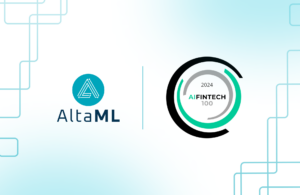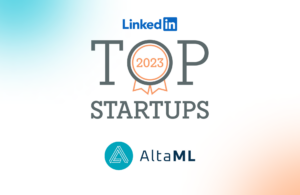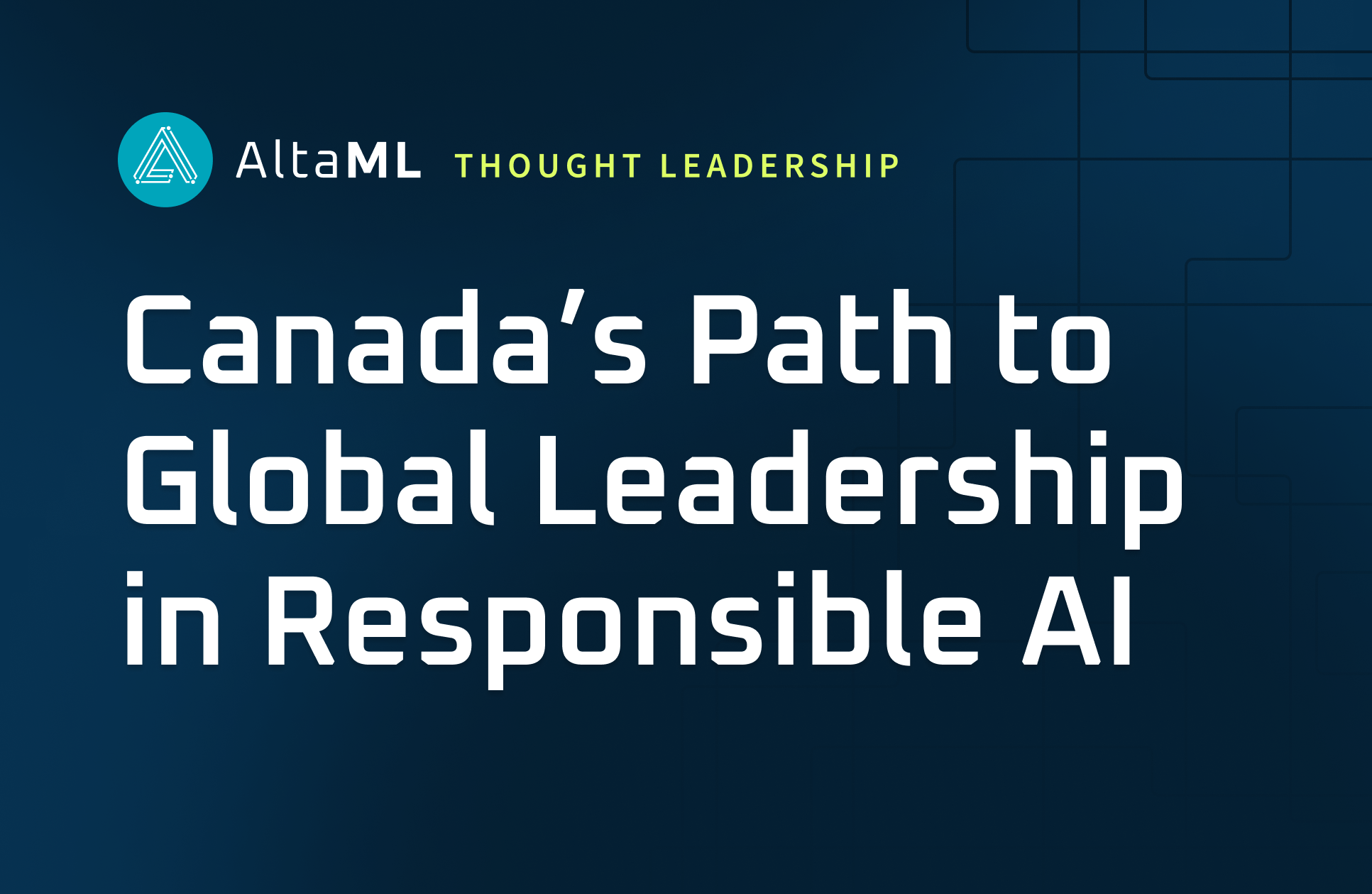Canada’s Path to Global Leadership in Responsible AI
February 9, 2024
•
5 min read
Nicole Janssen
Co-Founder & Co-CEO
For Canada to win at this stage in the artificial intelligence (AI) space, we must encourage innovation, take fewer missteps on the path to responsible AI (RAI) use, and maintain global relevance.
Becoming the global leader in responsible AI presents the most significant opportunity for our country in our lifetime. If we don’t grab hold of this opportunity now, we will not compete.
Becoming the global leader in responsible AI presents the most significant opportunity for our country in our lifetime. If we don’t grab hold of this opportunity now, we will not compete. Here’s why: Canada can’t risk being excluded from further global conversations on collaborative opportunities, or we risk falling farther behind.
Getting Bill C-27 Right for Canada’s Responsible AI Potential
The title of “global leader in responsible AI” is up for grabs. Canada is well-positioned to capture it. Imagine a time when AI solutions are not only bringing our productivity as a country back to a competitive level but also being one of our biggest exports because people know they can trust AI built in Canada. That potential is real, and it’s why getting Bill C-27 right is so crucial to the future of our country.
The effectiveness of this bill as a support to Canada hinges on its alignment with global jurisdictions. If regulations are incredibly different and onerous, the potential for AI will be squashed.
While I firmly recognize the importance of responsible practices when using and adopting AI, it’s also important to point out that there will be push back if we come at it too hard. We’re already witnessing it, and with the state of the world today, decision-makers need to act swiftly but also with a strategic, well-thought-out approach.
Canada is not a large enough market to establish and enforce regulations that do not align with the other major players on the global stage.
If our regulations make it more difficult to build and innovate, investors will dry up, and any hope of commercializing Canadian AI will be gone. Canada is not a large enough market to establish and enforce regulations that do not align with the other major players on the global stage.
We have seen how the EU’s AI Act, as written, could not adapt to the release of ChatGPT and generative AI. New technological advancements will be the norm in AI, and if we have to change our legislation each time, our legislation and regulations will never be suitable for the current state of the technology. Monitoring, evaluation, and continuous evolution are vital to any responsible AI framework.
Aligning Canadian Companies With Responsible AI
If Canada is the global leader in responsible AI, companies will want to work with Canadian companies, knowing they can trust that we are using AI responsibly and effectively.
Only 43% of Canadian organizations have implemented responsible AI frameworks, compared to 72% in the U.S.
According to a recent survey, only 43% of Canadian organizations have implemented RAI frameworks, compared to 72% in the U.S. Additionally, half of the surveyed organizations in Canada believe they strictly adhere to these frameworks, as opposed to 70% in the U.S.
Plainly put, it’s time to lead, not follow. Let’s make a bold statement and support it with action.
Let’s start bringing global leaders to Canada to collaborate and stop working in silos. Physical borders don’t confine AI software, and aligning with the largest economies like Europe and the U.S. will ensure success. We must ensure our country is aligned and equipped with the tools it needs to secure that title.
I expect Canada to come forward with regulations around AI similar to those of the EU in the months ahead.
Opportunities and Obstacles
The last year was transformative for us all. We all went through the growing pains of learning to adapt to a world led by AI. Now, we will see education stick, and the sooner that market education happens, the sooner we’ll see confidence build among society to increase adoption.
Individuals and organizations mustn’t let worst-case scenarios paralyze them but rather approach AI adoption with a well-informed and balanced perspective.
AI has a ton of potential, but there are risks that we all have to be conscious of without overshadowing it. While it’s crucial to emphasize the positive aspects, we must also acknowledge and address the potential ethical considerations and risks associated with AI. The ethical implications of AI, including issues related to bias, privacy, and job displacement, deserve a nuanced discussion. I want people to educate themselves so they can make informed decisions around AI, considering both the opportunities and the challenges it presents. Individuals and organizations mustn’t let worst-case scenarios paralyze them but rather approach AI adoption with a well-informed and balanced perspective.
The overall adoption of AI among Canadian organizations is significantly lower than in the U.S., with only 35% of Canadian businesses currently using AI in their operations, compared to 72% in the U.S., as highlighted in the survey. A shift is needed to drive sustained growth and retention in our region.
Whether you know it or not, 77% of our devices have one type or more of AI. In many ways, we already utilize AI in our everyday lives and don’t even know it. The advice I have for businesses, organizations, and governments using AI is this:
1 . Embrace change and continuous learning
2 . Start small
3 . Ensure RAI principles are at the core of your AI implementation
4 . Collaborate with the experts
5 . Start looking at the opportunities AI presents for your industry now
The Importance of Education, Small Wins, Talent Cultivation, and Agility
It’s fundamental to recognize the pivotal role of education in fostering RAI practices. Education empowers individuals to navigate the evolution of AI and plays a key role in addressing public concerns. By promoting educational initiatives highlighting AI’s ethical considerations, risks, and benefits, we can ensure a more informed and engaged society.
By promoting educational initiatives highlighting AI’s ethical considerations, risks, and benefits, we can ensure a more informed and engaged society.
When integrating AI, it’s common to be drawn to flashy, high-potential use cases. However, these often demand extensive time and significant change management, leading them to become elusive goals. The challenge arises when organizations prioritize these large-scale projects as their initial use case, often resulting in unrealized potential due to the complexity of change management required.
A key to successful integration is to support change management through achieving a series of small wins. Building excitement about AI’s potential and showcasing its benefits in everyday tasks can create a positive shift in overall attitudes surrounding AI. Witnessing these benefits on a smaller scale establishes the groundwork for exploring larger, more impactful use cases.
However, the main question then becomes: How can we strike a balance that encourages the adoption of advancing technology without lagging behind? One effective approach is providing top-tier AI talent through skills acceleration and education, in academic institutions and through work-integrated learning opportunities.
Finding the middle ground is paramount, as there’s a fine line between being cautious and missing out on opportunities. Canada stands out regarding AI research, with institutions like the University of Alberta holding a distinguished position in global rankings for AI and machine learning research.
Organizations and the country as a whole must invest in AI models that not only demonstrate effectiveness but also possess longevity and adaptability.
To stay ahead, organizations and the country as a whole must invest in AI models that not only demonstrate effectiveness but also possess longevity and adaptability. Those that fail to prioritize agility in their AI strategies risk becoming less competitive and trustworthy. In the Canadian context, where innovation is key to maintaining a leading edge, failure to embrace the evolving nature of AI could result in falling behind in the technological race entirely.
The Call to Action for Responsible AI
Guiding policymakers toward informed and responsible decisions in AI development is not just advisable; it is imperative. As we aspire to be the global leader in RAI, it is within our reach; we have to put in the work to secure it. Policymakers must engage in global collaboration, actively seeking insights from AI companies, researchers, and experts. This collaborative approach is essential to propel us toward our goal.
By taking the lead in setting robust yet flexible regulations from the outset, Canada can mitigate risks, ensuring the retention of businesses, research, and top-tier talent.
However, potential hurdles lie ahead, particularly concerning regulations. These regulations can impact talent retention in Canada, disrupt industries, and halt innovation. This is a critical consideration for a country boasting some of the top research institutions globally. Without proactive changes, there is a real risk of businesses and talented individuals seeking opportunities elsewhere. By taking the lead in setting robust yet flexible regulations from the outset, Canada can mitigate this risk, ensuring the retention of both businesses, research, and top-tier talent.
Government must be a leader in integrating AI. Several governments at all levels have begun showing leadership here, but that isn’t enough. Fostering a culture of adaptability is not just a strategic choice but a necessity to remain at the forefront of this space. As we navigate the future of AI, collaboration between cross-jurisdictional leaders, policymakers, and organizations will be instrumental in securing Canada’s position as a global leader in RAI. It’s time for all Canadians to have more confidence and begin to proudly tell the world about our strengths.
Credit: This Op-Ed was published in The Future Economy on Feb. 9, 2024.
 Navigating Bias in AI with Open-Source Toolkits
Navigating Bias in AI with Open-Source Toolkits
 AltaML Secures Spot on AIFinTech100 for Consecutive Year
AltaML Secures Spot on AIFinTech100 for Consecutive Year
 Jurisage and CiteRight Finalize Merger, Become Jurisage Group Inc.
Jurisage and CiteRight Finalize Merger, Become Jurisage Group Inc.


